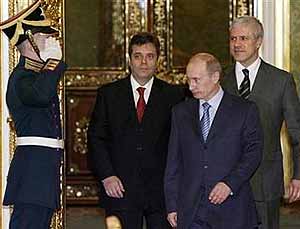February 05, 2008 (the date of publication in Russian)
Mikhail Sinitsyn
RUSSIA+ SERBIA=?
Moscow could offer Belgrade something more substantial than a gas pipeline deal
 The outcome of Serbian elections will not aggravate the relations between Moscow and Belgrade. This fact in itself is encouraging. Both of the two major contenders for the post of Serbia's President, Boris Tadic and Tomislav Nikolic, visited Moscow between two rounds of the elections. The Russian political elite did not demonstrate special sympathy to any of the two, thus securing itself from the blunder once made with Ukraine and Abkhazia, where Moscow's preferable partners lost the vote.
The outcome of Serbian elections will not aggravate the relations between Moscow and Belgrade. This fact in itself is encouraging. Both of the two major contenders for the post of Serbia's President, Boris Tadic and Tomislav Nikolic, visited Moscow between two rounds of the elections. The Russian political elite did not demonstrate special sympathy to any of the two, thus securing itself from the blunder once made with Ukraine and Abkhazia, where Moscow's preferable partners lost the vote.
Still, this ambiguity reflects also difference in views and motives in the Russian community. Tomislav Nikolic, leader of the Serbian Radical Party, was a preferable candidate for broad Russian patriotic circles, viewed by them as a symbol of Serbia's national revival. Top officials of Russia's Foreign Ministry were more restrained, though Nikolic was expressing firm commitment for partnership with Russia. Similar irrational restraint is demonstrated by top Russian officials in the dialogue with most friendly political figures from Belarus, Ukraine and Bulgaria.
Boris Tadic's slender majority in the second round of Serbian elections made clear that the Serbian Radical Party is still a powerful force, which has to be considered in bilateral partnership in any case.
Moreover, the popularity of Tomislav Nikolic among Serbs significantly influenced the rhetoric of his rival, as well as the policy of international institutions which preferred to postpone the solution of the long-discussed problem of the breakaway autonomy of Kosovo until Serbia elects its leader. In his campaign, Tadic had to consider the strong patriotic ferment in the population – similarly to the leadership of Russia years before. Tadic preferred to downplay his earlier expressed pro-Western orientation, as well as the commitment to open the markets and to complete the dismantlement of the remains of the Yugoslavian Popular Army.
The fate of pro-Western Prime Minister Zoran Djindjic, who was assassinated in Belgrade in 2003, also serves as an illustrative lesson for Tadic. The spectacular change in Tadic's rhetoric served as a convenient pretext for diplomatic understanding with the Russian establishment that is generally more eager to deal with "flexible" political figures than with staunch patriots like Belarus's leader Alexander Lukashenko.
Tadic is probably considered in the Russian top political and business establishment as a more convenient counterpart for discussing joint energy policy as well. He was personally invited for signing the bilateral agreement with Gazprom – though Prime Minister Vojislav Kostunica preferred this deal to be signed on the level of the Ministry of Infrastructure, chaired by his close political ally Velimir Ilic.
Providing the possibility for Tadic to gain additional popularity by direct involvement in the Moscow-signed deal, the Russian official side probably suggested that under these circumstances, Tadic would later have to comply with the bilateral agreements. This pragmatic political calculation was formally correct, though Tadic's strong personal dependence on Western politicians and institutions questions his reliability of Russia's partner.
At the same time, the official circles of Russia were obviously unable to offer Serbia anything but cooperation in gas pipeline projects. In the nearest future, Moscow will have to develop a broader format of partnership.
In his campaign, Boris Tadic emphasized that the European choice of Serbia does not contradict to Serbia's national identity. In practice, however, new EU members are usually forced to give up their identity, unlike the nations of "old Europe".
At the same time, the recent tragic experience of the Serbian people predetermines a significant difference from other East European nations. The aftermath of the national tragedy on the level of mass psychology doubts the possibility of hybridization of Serbian identity and European self-perception. Moreover, attempts of such hybridization may lead pro-Western politicians of Belgrade into a political vacuum.
Though the outcome of the elections is viewed in the European Union as the best of worst options, Serbia's domestic political situation is very distant from harmony. The country may face new serious internal clashes. This probability requires a more responsible approach from Russia. Therefore, it is vitally important for Moscow to offer Belgrade a more comprehensive framework of relations than trade agreements on delivery of energy sources. This framework should be built up before the Serbs are faced with the final choice.
Mikhail Sinitsyn is a member of Russia's Youth Public Chamber
Number of shows: 1102
 ENG
ENG 

 ENG
ENG 
